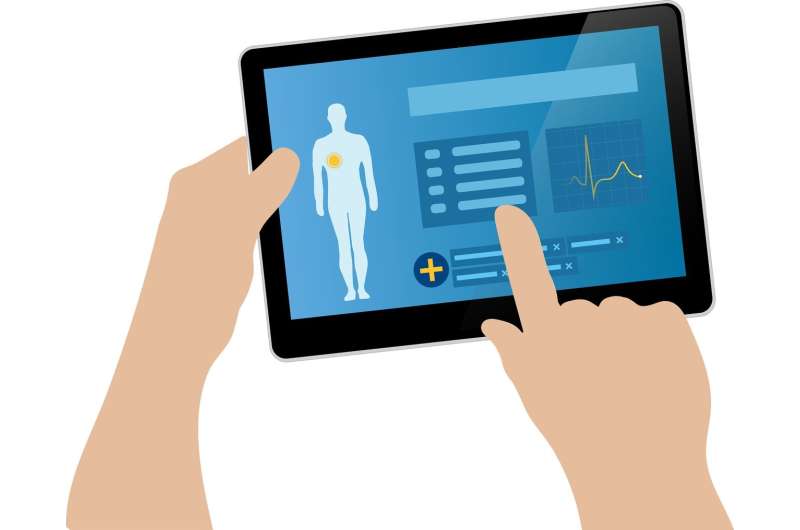This article has been reviewed according to Science X's editorial process and policies. Editors have highlighted the following attributes while ensuring the content's credibility:
fact-checked
trusted source
proofread
Electronic health records can contain bias, potentially impacting clinical trials

Results of clinical trials are only as good as the data upon which they rest. This is especially true in terms of diversity—if most people in a trial are from a certain race or socioeconomic group, then the results may not be broadly applicable.
This form of potential bias is not a novel concept. But a group of researchers at the University of Illinois Chicago and colleagues has identified a potential hidden source of bias: electronic health records.
In a recent Contemporary Clinical Trials commentary, the researchers explain how embedded pragmatic clinical trials, or ePCTs, which test the effectiveness of medical interventions in real-world settings, potentially leave out people who are from underrepresented and underserved groups. And even when participants from these groups are included, the researchers may collect incomplete or inaccurate data. These sorts of trials are conducted during routine clinical care on a wide range of patients, unlike more traditional clinical trials that use laboratory conditions and have stricter rules about who is eligible, often excluding people with underlying health conditions.
Embedded pragmatic clinical trials rely heavily on electronic health records for data collection, which is problematic in a few ways, the authors write. To start with, only people who access health care services will have a health record, so health information from groups that have difficulty seeing health care providers, because of cost or travel time or distrust of the medical system, won't be in these systems. Furthermore, ePCTs sometimes rely on participants to self-report their symptoms within a patient portal that connects them to their electronic records. But these systems can be inaccessible for people who don't have reliable access to the internet and smartphones, and can also be difficult to understand for those with less education or who have difficulty with the languages used in the questionnaires.
This reliance on electronic records is "almost a hidden form of bias," explained Dr. Andrew Boyd, UIC associate professor of biomedical and health information sciences and lead author of the commentary.
The exclusion of certain groups becomes a self-perpetuating cycle. When groups aren't included in trials, they don't inform the trial's results, which means that healthcare practitioners who later rely on those results may not be giving good advice to people from those same under-represented groups—all of which continue to exacerbate health inequities. This is especially problematic when it comes to artificial intelligence algorithms, which are becoming more common in medical decision-making, Boyd explained.
"If these groups are not deliberately sought out for trials, then ultimately the AI or machine learning isn't going to meet their needs," he said.
This is particularly frustrating since ePCTs are generally considered a way of including more diverse participants in clinical trials by expanding beyond the confines of more rigidly controlled traditional trials.
Judith Schlaeger, associate professor in the College of Nursing and senior author of the commentary, was struck by the fact that filling out medical charts in the electronic health record is such an automatic part of a clinician's job that they rarely stop to think about implications in terms of how accurate the data in there is.
"This is all in the background, yet it's so vitally important in terms of impacting people's health," she said.
The authors offer several ideas for how to remedy the situation.
For example, researchers could use text messages to recruit participants who don't have an electronic health record. This would also help those who do have an electronic record but don't have easy access to the internet and might have to spend a good deal of time traveling to, say, a library to use a computer.
Studies that use patient-reported outcomes must also ensure that the questionnaires are written to the correct literacy level. The authors recommend that community groups be involved in reviewing these sorts of questionnaires. And they should include more questions about participants' lives to gain a fuller picture of their overall health, such as whether they have easy access to a grocery store and pharmacy, or whether their neighborhood is safe. Electronic health records should also include information about people's multiple identities and experiences, such as religion, sexual identity and educational status, so that researchers can consider the effects of intersectionality on what is being tested in an ePCT.
The commentary grew out of discussions among a national group of researchers who all conduct ePCTs. At UIC, the authors are part of a study on using guided relaxation and acupuncture to reduce the chronic pain of sickle cell disease. Those researchers, who are also authors of this piece, include Crystal Patil, professor in the College of Nursing, nursing student Juanita Darby and biomedical informatics student Jonathan Leigh.
More information: Andrew D. Boyd et al, Equity and bias in electronic health records data, Contemporary Clinical Trials (2023). DOI: 10.1016/j.cct.2023.107238




















